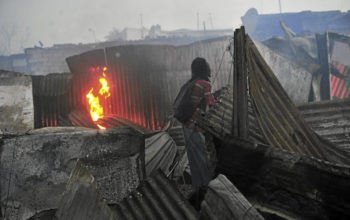By Jonk wa Mashamba
news@alexreporter.co.za
The recent chaotic scenes at Alexandra High School when learners stormed the school kitchen, demanding that they would not eat phuthu and maas, left many residents flabbergasted.





On the video that went rival, learners were seen storming into the kitchen, took the pot full of food and started throwing it all over the premises.
On the same day, a Grade 10 learner stabbed and wounded a security guard at Realogile Secondary School.
The needle the learner used is allegedly used for drugs. The victim was taken to a medical facility and the cause of the attack is not immediately known.

The high level of anarchy portrayed by some learners, left a few community members with endless questions about the future of those learners.
While some called for severe punishment of the perpetrators, others said the learners were minors in need of forgiveness and growth.
The spokesperson for the Gauteng Department of Education, Steve Mabona, had made no comments at the time of publication.
However, Councillor Tefo Raphadu had varying opinions. He said issues of anarchy among learners were something that needed to be dealt with urgently, especially by parents.
Raphadu said the involvement of parents in schools was a crucial issue that should be addressed on an urgent basis.
” We need parents that are proactive. There are policies that run the schools and only parents can change them. The policy that says, if you stab or we find you with dagga, you will be expelled. But if they don’t come to the meetings, it becomes a problem.”
Raphadu described anarchy in schools as a societal problem. “We are living in a violet society.”
He said that during their school readiness program, they found that most of Alex schools were ready in terms of the administrative component.
However, he said the physical infrastructure of schools were not up to standard. “You would find windows broken and furniture like desk and chairs are short.”
He said that inadequate furniture in schools leads to conflicts among learners. “Kids fight for chairs and stab each other.”
He said overcrowing was another issue they found. ” Schools are catered to take a certain amount of learners. You find that kids are 63 in the class, but 12 of them don’t have chairs. We asked the Department of education to bring more mobile classes so that we have less kids than the 63 that we have in the class.
“Outside of physical structure and what is needed for the effective learning and teaching, we found that there are many kids who are poor, kids who are orphans.
” You can see that shirts and trousers are torn…everything is a mess. When you talk to them, you find that’s a socio-economic situation at home, they can’t afford.”
Raphadu said John Masike, an activist, was trying to alleviate such challenges through Alex Sanitary Project, by making sure that” we get donations for children, school uniform and sanitary pads. Because those are the triple challenges that we are facing”.
” We found that kids, mostly girls, miss roughly 60-70 days because of periods. And if you calculate the days that they missed, 5 days for every month, that’s sixty days.
” And how do you expect the learner to pass while she has missed 60 days of teaching and learning? These are frustrations that we met up with during the school readiness and back to school campaign,” he said.




